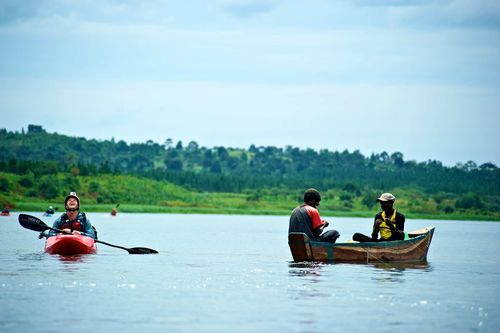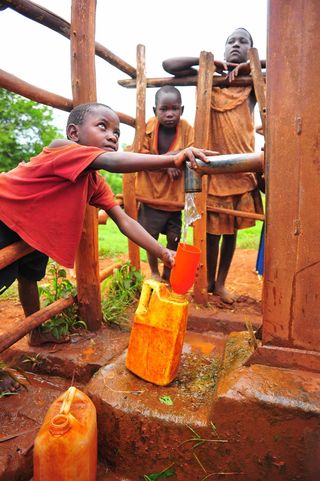The following dispatch is from extreme kayaker, . He and members of the are currently on an expedition in Africa. Their goal: to make a first descent on the running out of Lake Tanganyika and into the Congo basin. The kayakers will begin their journey on the Nile in Uganda and will follow over land through Rwanda, Burundi, Tanzania and into the Congo via Kalemie. Then they will tackle the Lukuga. This is their first dispatch.

(Stookesberry, left, on the Nile.)
, , , and I landed on the northern edge of Lake Victoria in Kampala exactly 30 hours after leaving Reno, Nevada. Incredibly, it only cost $400 to transport kayaks and a few hundred pounds of gear. What's more, everything arrived on time. Well, almost everything. Darin's paddle didn't make it. The paddle escaped its duct tape attachment, and since we watched it successfully load on the plane in Brussels, we knew it must have been ripped off in Rwanda during the layover en route to Uganda. Extremely helpful baggage agents assured us that they would exhaust all means in order to retrieve the lost item.
We met our guide and trip leader, , for the first time just outside customs. Wind, thunder, and flickering lights signaled a storm approaching —the second largest lake by surface area in the world. “Rainfall on the lake alone produces 80 percent of the water that flows down the section of the Nile that you will see tomorrow,” Hendri said. “Better sleep well tonight boys!”
We found out the next day that the crystal clear Victoria Nile, often referred to as the White Nile, flows at about the same volume as the Colorado in the Grand Canyon. Known to whitewater kayakers as one of the holy grails of the sport, the future of this majestic stretch of big water rapids is in jeopardy. A hydroelectric power project will end the most popular and accessible stretch of rapids by the end of 2011. The rest of the rapids will also die down. For kayakers it will be a massive loss, but to the local community there are a number of positives. The project promises much needed electricity and funding to important governmental and Non-Governmental Organizations (NGO's) that are tackling the country's needs.
From what we've seen so far, the greatest need is clean water. People parade up and down the red earthen roads that line the river carrying yellow jerry cans. According to , a clean water and sanitation NGO in the region, nearly 40 percent or 13 million Ugandan's have no access to clean drinking water. Apparently this is why the number one killer of children under five years old is dysentery. It's hard to comprehend the problem when looking at a place with no shortage of water; the massive lake and tributary system that pours into the Nile sends a near constant flow of water through the heart of the country. 
As our expedition proceeds through the Nile basin and into the Congo, we will face the challenge of keeping our own drinking water clean. We will see the staggering number of people affected by the clean water crisis as we journey into places that the outside world has never scene before.
Next on the agenda is to run the mighty , where the question of the southern source of the Nile river was finally settled only 150 years ago. More recently, it's a region plagued by civil conflict.
However, the most notable part of our journey will certainly be observing the unique wildlife on the river. The river is said to have the highest concentration of hippos and crocs on the planet. According to Hendri, we'll need “a bit of exercise in patience and self control: the patience to wait for a hippo-free place to camp at night, and the self control not to lose our cool when a 14-foot croc comes looking for dinner.”
Just received a note from the airport. In the words of the baggage officials. “The search for Mr. McQuoid's rafting bat continues… please do not lose hope!”
–Ben Stookesberry